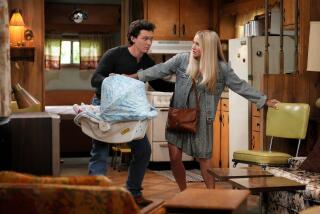Television review: ‘The Borgias’
- Share via
Hot on the heels of the departed “The Tudors,” “The Borgias” arrives on Showtime this Sunday. I won’t say I saw it coming, but now that it’s here — it’s “The Tudors” meets “The Sopranos,” a point underscored by its tag line, “The original crime family” — it seems all but inevitable. Indeed, this is only the first of two series on that murderous Renaissance clan coming your way this year. The second, Tom Fontana’s “Borgia,” is being made with French money, with former HBO honcho Chris Albrecht along as an executive producer. Filmmaker Neil Jordan (“The Crying Game,” “Mona Lisa”) created the present series, and it’s more dignified than might be expected, given the venue and the source material, with the look of old Italian paintings — you can practically see the crazing on your screen — if lacking actual Italian light.
So meet the Borgias: There is Papa Rodrigo (Jeremy Irons), who by the end of the first hour will be Pope Alexander VI, and his beloved bevy of illegitimate children, established in something like domestic concord in the home of their mother, a former courtesan (Joanne Whalley). Eldest son Juan (David Oakes) is a hothead soldier who gets into brawls and, in one scene, in what could almost be a commentary on the premium-cable process, improves an old Roman comedy by the addition of female nudity. Middle son and family fixer Cesare (good-looking Francois Arnaud, after Irons’ pope the star of the story) has followed father into the Church but would rather sin as an ordinary citizen.
Sister Lucrezia, latterly the best-known Borgia for her legendary though not proved adventures in poisoning, is only 12 when we meet her, her head full of unicorns and sea horses. Holliday Grainger, the actress who plays her, is 23, which makes Lucrezia seem at first less a child than a flibbertigibbet, but this sorts itself out as time moves on. Cesare wishes that his sister never marry but swears that if any husband ever mistreats her, he’ll “cut his heart out with a dinner knife and serve it to you.” (“I shall never love a husband as I love you,” is her answer to that.) Innocent that she is, Lucrezia also serves as a surrogate for the muddled viewer: “Can the pope have children?” she asks, taking charge of our own question. There is also a much younger son (Aidan Alexander), too small to cause serious trouble.
We encounter them at the end of a period of relative peace, before Dad grabs the miter and becomes two men — Rodrigo and Alexander, person and pope, confusing God’s work with his own family fortunes and pet projects — and the strains and stresses of power complicate their days. That is pretty much the whole argument for our sympathy, for though Jordan has worked to make the Borgias understandable in human terms, it’s hard to deeply care for them (as it was to care for the Sopranos in the end). This is a condition of the contemporary fondness for heroes a politer time would have reckoned villains. Because it doesn’t matter, finally, what becomes of them, we watch less in suspense than in wonder: wonder at the cheek and gall of these characters; wondering how true any of it is; and wondering, most profitably, at the performances, the least of which are good and the best of which are good fun.
That, more than the story — which, notwithstanding the curlicues of palace intrigue, is in broad strokes easy to anticipate, so clear are everyone’s intentions and options — is what makes “The Borgias” worth your while. Irons, an actor who seems draped in the accumulated vices of the odd ducks he’s played over the years, lies back and steals the show with the music of his worn, woody bassoon of a voice, soothing in a way that also pricks you to be on guard against it.
Hearing the confession of his future new mistress (Lotte Verbeek), he gives her her penance: “Flagellate your naked body twice nightly.”
“With knotted cord, your holiness?” she asks.
“Cord of silk will suffice.”
More to Read
The biggest entertainment stories
Get our big stories about Hollywood, film, television, music, arts, culture and more right in your inbox as soon as they publish.
You may occasionally receive promotional content from the Los Angeles Times.











